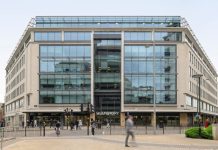More new developments are needed in the Midlands commercial market to satisfy current occupier and investment demand, according to the latest RICS UK Commercial Market Survey, Q4 2016.
Confidence returned to the commercial market in the last quarter of 2016 with interest from investors increasing for the second consecutive quarter with growth in enquiries gaining momentum, as 23% more chartered surveyors reported an increase. Demand from occupiers also increased during the quarter, with a net balance of 21% of respondents reporting a rise.
Despite a slight pick-up in development starts in Q4 demand growth is still outpacing that of supply across the entire region. Only 6% more respondents reported an increase in new commercial construction activity at the headline level with the office sector reporting the strongest growth and retail remaining relatively unchanged from previous quarters.
Continued strength in occupier demand has led to a further decline in availability, with 18% of chartered surveyors reporting a fall rather than a rise in available properties to lease. A fall in availability in the industrial sector is reported as being the most notable.
Against a backdrop of reduced availability, inducements fell this quarter across all sectors apart from retail. The value of incentive packages on offer to prospective tenants in the retail sector reportedly rose across the Midlands this quarter and has now risen slightly in each of the last three quarters.
20% more respondents expect to see rents rise across all sectors in the coming three months. Near term rent expectations in the industrial sector have been pushed higher and are now pointing to strong growth in the region, with 28% more respondents envisaging a rise in industrial rents in the coming three months. Positive gains are also expected across office space and retail in the near term. On the twelve month horizon rent expectations also remain positive with a net balance of +36% of respondents anticipating growth. Investment enquiries across the region once again grew in the latter part of 2016. Overall, 23% more respondents reported an increase in investment enquiries with the industrial sector once again seeing the most interest. Retail investment remained positive this quarter but growth was relatively subdued in comparison to other areas.
Near term capital value expectations remained positive across all sectors in Q4, with 24% more chartered surveyors projecting values to rise (rather than fall) over the coming quarter. Over the next twelve months, respondents anticipate capital values will increase across the majority of sectors, led by the prime industrial and prime office markets. In terms of the headline picture, 43% more respondents expect to see a rise rather than a fall in capital value over the next twelve months.
This quarter we once again asked respondents on a national level whether they have seen any movement in the market following the EU Referendum vote. 39% believe it is likely that relocation would occur; this is up slightly from the Q3 reading of 33%.
Simon Rubinsohn, RICS Chief Economist, commented: “The results for the Q4 survey suggest that the commercial property market is continuing to attract investor interest despite ongoing concerns about pricing in the capital and the prospects for the economy more generally. Indeed, the feedback we have received is consistent with a renewed appetite from overseas buyers for UK assets.
“Meanwhile the results for the occupier market highlight the resilience of the economy in the wake of the vote to leave the EU but also clearly demonstrate the demand for large warehouses to support the development of the distribution industry as consumers increasing go online to make their purchases”.
Looking ahead Mark Bielby of Miller Birch commented: “Nobody can envisage how the Brexit negotiations will affect the property market. However the market can be one of the first to react to uncertainty. It creates inertia in the investment and occupier markets. We need to see what type of deal we negotiate as we exit the EU. This will also determine how foreign investors will place their funds in the UK. Once occupiers, especially office occupiers, can start to see stability ahead they will dust off their expansion plans. The industrial market will continue to thrive on the back of a lack of supply. Distribution will continue to drive the development of large industrial sites as well as the smaller last mile warehouses such as Amazon continue to expand. What the future holds for retail is still yet to be seen. It could suffer as inflation starts to rise and wages don’t keep pace. This could lead to sales will fall and secondary property will start to suffer with increasing vacancies.”





















